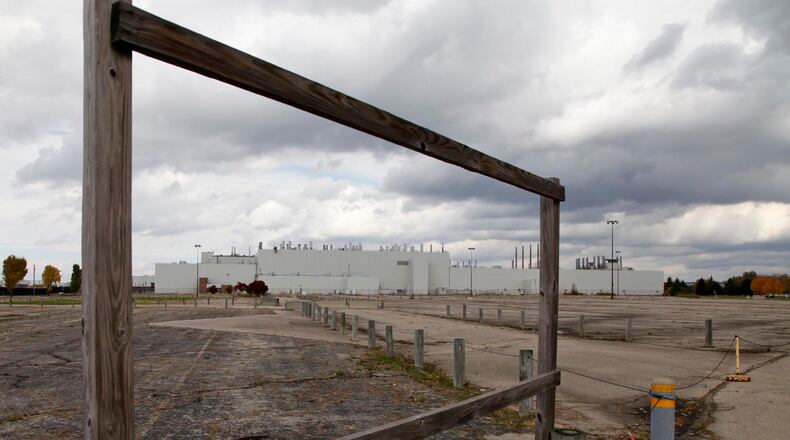MORE: Fuyao to add 100 jobs in Moraine, plans $46M investment
The local GM plant had employed 1,000 when it closed Dec. 2008, and at its peak employed more than 4,000 people. The manufacturing jobs provided middle to upper middle class wages and had a broader economic impact of supporting related industries.
“When people lose their job, you see increase amounts of anxiety and depression. They are not only disorders that affect the mind, they are physical disorders that affect the body and make your body ache and makes your body physically tired,” said Jodi Long, associate director for Montgomery County Alcohol, Drug Addiction and Mental Health Services.
The study is also published while thousands of communities are suing opioid makers and distributors, accusing them of fueling the public health crisis by flooding communities with the powerful painkillers.
The study, whose lead author was Dr. Atheendar Venkataramani of the Perelman School of Medicine at University of Pennsylvania, stated that the researchers’ findings “should not be interpreted in such a way as to diminish the role of opioid supply, either from physician prescriptions or from illicitly made and supplied synthetic substances, in the US opioid overdose crisis.”
MORE: Miami-Luken case raises questions of who is responsible for opioid crisis
Instead, researchers wrote that their findings suggest that successful approaches to address the opioid overdose crisis will likely involve complementary interventions to reduce the prescription and illicit opioid supply as well as interventions to diagnose and treat substance use disorders in regions of the country hardest hit by structural economic change.
Amy Bush Stevens, vice president or prevention and public health policy, Health Policy Institute of Ohio, said to understand the opioid crisis you have to look at both supply and demand issues, from prescription supply issues, to the amount of fentanyl and carfentanil, to regional economic factors. The loss of manufacturing jobs with self-sufficient wages was one of those many factors.
“In Ohio, we had a perfect storm of factors,” she said.
Along the same lines, Stevens said there are also ways communities can buffer against the fall out of economic hardship and help people earn a self-sufficient wage, such as raising the income cap on child care assistance, boosting career and tech education programs, and expanding the earned income tax credit.
MORE: Crown Equipment offers workers voluntary layoff program
“That can help prevent addiction and also support those who are struggling through recovery,” Stevens said.
Jonas Thom, CareSource vice president of behavioral health, said the findings reinforce what’s known about the correlation between social and economic conditions and addiction. When communities are under stress, people react to that and when people have less resources to address their mental health concerns, addiction often worsens at the population level.
The Dayton-based insurer, which covers over half of Ohio Medicaid managed care plans, recently expanded to also manage those members mental health and addiction coverage. Thom said that economic connection to health is why they try to also address issues that aren’t health specific, such as giving members access to a life coach to work on health barriers like unemployment.
“It’s a pretty well known and established correlation. We know we’re responsible to try to find innovative ways to improve health and wellness,” Thom said.
━━━━━━━━
Supportive services
The following workforce initiatives can help people with mental illness and/or substance use disorder in Montgomery County:
• CareSource Life Services Job Connect: Helps with life coaching, access to resources, and job opportunities. Services include professional development, legal aid, personal finance, housing, community support, food access. 937-225-330 or caresource.com.
• Eastway Behavioral Healthcare supported employment services: Employment specialists help with job seeking, mock interviews, resume development and peer support groups to ensure job retention. 937-496-2000 or eastway.org.
• Goodwill Easterseals Miami Valley Works: Helps with long-term job readiness training and ongoing coaching, support services, counseling, and follow-up. (937) 461-4800 or www.gesmv.org.
• Urban League SOAR: Aimed at helping the chronically unemployed remove barriers to their employment. The initial program emphasizes the “soft skills” necessary to successfully hold any job – showing up on time; working well with others; taking responsibility. 937-226-1513 or www.ulgso.org.
• Sinclair supported education program: Helps students dealing with mental health conditions. Program available at Huber Heights Learning Center and Englewood Learning Center. Includes services like case management, referrals, and crisis intervention counseling. 937-512-5113 or sinclair.edu.
• South Community Employment Services: Designed to help employers and employees deal with personal and workplace challenges. Save employers millions of dollars each year by intervening in personal and work issues that affect productivity, and the emotional well-being of employees and their family members. 937-293-8300 or southcommunity.com.
Source: Montgomery County ADAMHS
About the Author
